Blog Highlights
- Our first report card in South America – The Orinoco River Basin, Columbia
- Mackay Report Card workshop – Mackay, Queensland Australia
- Scientists underwater: Reginald Truitt, Gilbert Klingle, the Bentharium, and the Aquascope
- Resilience based management of the Great Barrier Reef – Developing an Index of Resilience to Climate Change Impacts to the Great Barrier Reef Workshop 3, Townsville, Australia
- Brainstorming in the Innovation Room with World Wildlife Fund
IAN partnering with the World Wildlife Fund
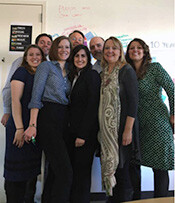 IAN has begun what is planned to be a lasting relationship with the World Wildlife Fund (WWF) to advance our collective vision of achieving better conservation outcomes globally. Simon Costanzo, Alex Fries, and Bill Dennison travelled into the WWF US Headquarters in Washington D.C. for a brainstorming session on a global approach to environmental report cards (or scorecards) to assess rivers of the world. Currently, IAN and WWF are partnering on a report card for the Colombian tributaries of the Orinoco River, which is the platform for expansion of the partnership to some of the 273 transboundary rivers that WWF have prioritized. The combination of IAN and WWF skills and capacity appears to be a great fit for successfully achieving this goal and will be a significant step in IAN's evolution moving forward.
IAN has begun what is planned to be a lasting relationship with the World Wildlife Fund (WWF) to advance our collective vision of achieving better conservation outcomes globally. Simon Costanzo, Alex Fries, and Bill Dennison travelled into the WWF US Headquarters in Washington D.C. for a brainstorming session on a global approach to environmental report cards (or scorecards) to assess rivers of the world. Currently, IAN and WWF are partnering on a report card for the Colombian tributaries of the Orinoco River, which is the platform for expansion of the partnership to some of the 273 transboundary rivers that WWF have prioritized. The combination of IAN and WWF skills and capacity appears to be a great fit for successfully achieving this goal and will be a significant step in IAN's evolution moving forward.
The Meta River Report Card Workshop
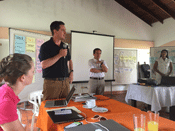 The Orinoco Basin Health Report Card was officially kicked-off in June 2015 with the first stakeholder engagement meeting in Puerto López, in the Orinoquía Region of Meta Department, Colombia. Alexandra Fries and Simon Costanzo traveled to Colombia along with our partners from the WWF office in Washington DC, Sarah Freeman and Catherine Blancard. More than 40 representatives from 19 organizations attended the workshop aimed at identifying the environmental, social and economic indicators that will form the basis of the Meta River Report Card. Indicators were chosen based on the top values identified as key to the future sustainability of the Meta River basin. Participating institutions included the Ministry of Environment and Sustainable Development, the Humboldt Institute, Corporinoquia, Omacha Foundation, Fundacion Orinoquia, and WWF Colombia.
The Orinoco Basin Health Report Card was officially kicked-off in June 2015 with the first stakeholder engagement meeting in Puerto López, in the Orinoquía Region of Meta Department, Colombia. Alexandra Fries and Simon Costanzo traveled to Colombia along with our partners from the WWF office in Washington DC, Sarah Freeman and Catherine Blancard. More than 40 representatives from 19 organizations attended the workshop aimed at identifying the environmental, social and economic indicators that will form the basis of the Meta River Report Card. Indicators were chosen based on the top values identified as key to the future sustainability of the Meta River basin. Participating institutions included the Ministry of Environment and Sustainable Development, the Humboldt Institute, Corporinoquia, Omacha Foundation, Fundacion Orinoquia, and WWF Colombia.
Meta River Workshop newsletter
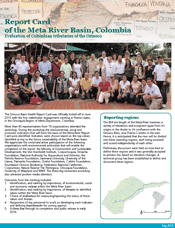 The Meta River Report Card Workshop newsletter, released in both English and Spanish, summarizes the outcomes from the report card workshop that took place in Puerto Lopez, Colombia. Values, threats, and indicators were the key items determined during the three day workshop. We also established a technical working group to develop the indicator thresholds and scoring, along with a timeline for release of the report card. IAN is developing report cards for three tributaries of the Orinoco River in Colombia.
The Meta River Report Card Workshop newsletter, released in both English and Spanish, summarizes the outcomes from the report card workshop that took place in Puerto Lopez, Colombia. Values, threats, and indicators were the key items determined during the three day workshop. We also established a technical working group to develop the indicator thresholds and scoring, along with a timeline for release of the report card. IAN is developing report cards for three tributaries of the Orinoco River in Colombia.
Bita River report card workshop held in Colombia
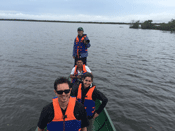 The second workshop for the Orinoco Basin Health Report Cards occurred in August 2015 with the stakeholder engagement meeting in Puerto Carreno, in the Vichada Department of Colombia. More than 46 representatives from 25 organizations attended the workshop aimed at identifying the environmental, social, and economic indicators that will form the basis of the Bita River Report Card. Indicators were chosen based on the top values and threats identified as key to the future sustainability of the Bita River basin. Participating institutions included the Ministry of Environment and Sustainable Development, Humboldt Institute, Corporinoquia, Omacha Foundation, Fundacion Orinoquia, and WWF Colombia.
The second workshop for the Orinoco Basin Health Report Cards occurred in August 2015 with the stakeholder engagement meeting in Puerto Carreno, in the Vichada Department of Colombia. More than 46 representatives from 25 organizations attended the workshop aimed at identifying the environmental, social, and economic indicators that will form the basis of the Bita River Report Card. Indicators were chosen based on the top values and threats identified as key to the future sustainability of the Bita River basin. Participating institutions included the Ministry of Environment and Sustainable Development, Humboldt Institute, Corporinoquia, Omacha Foundation, Fundacion Orinoquia, and WWF Colombia.
Guaviare River Report Card workshop - Colombia
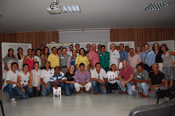 The third workshop for the Orinoco Basin Health Report Cards occurred in September 2015 with the stakeholder engagement meeting in San Jose del Guaviare, Colombia. More than 55 representatives from 27 organizations attended the workshop aimed at identifying the environmental, social, and economic indicators that will form the basis of the Guaviare River Report Card. Indicators were chosen based on the top values and threats identified as key to the future sustainability of the Guaviare River basin. Participating institutions included the Ministry of Environment and Sustainable Development, Humboldt Institute, Sinchi Institute, Omacha Foundation, and WWF Colombia among others.
The third workshop for the Orinoco Basin Health Report Cards occurred in September 2015 with the stakeholder engagement meeting in San Jose del Guaviare, Colombia. More than 55 representatives from 27 organizations attended the workshop aimed at identifying the environmental, social, and economic indicators that will form the basis of the Guaviare River Report Card. Indicators were chosen based on the top values and threats identified as key to the future sustainability of the Guaviare River basin. Participating institutions included the Ministry of Environment and Sustainable Development, Humboldt Institute, Sinchi Institute, Omacha Foundation, and WWF Colombia among others.
Orinoco River Report Card Highlighted in World Wildlife Magazine
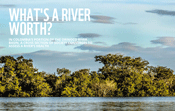 The WWF UMCES Partnership continues to successfully grow and expand with the release of a magazine article on the Orinoco River Report Card. The article: What's a river worth? In Colombia's portion of the Orinoco River Basin, a cross section of society converges to assess a river's health, was published in the Spring 2016 version of the quarterly magazine. The Orinoco River Report Card is currently being developed, with a scheduled July 2016 release, and the article highlights some of the stories in the Orinoco region. You can view the article on WWF's website.
The WWF UMCES Partnership continues to successfully grow and expand with the release of a magazine article on the Orinoco River Report Card. The article: What's a river worth? In Colombia's portion of the Orinoco River Basin, a cross section of society converges to assess a river's health, was published in the Spring 2016 version of the quarterly magazine. The Orinoco River Report Card is currently being developed, with a scheduled July 2016 release, and the article highlights some of the stories in the Orinoco region. You can view the article on WWF's website.
Orinoco River Basin Report Card released in Bogota, Colombia
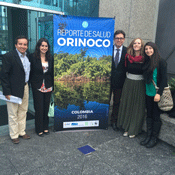 On July 6th, the Orinoco River Basin Report Card was released in Bogota, Colombia. Simon Costanzo and Alexandra Fries, along with partners from WWF US and WWF Colombia launched the report card at the Maloka Museum to over 100 attendees. The release included the report card results, several videos highlighting the Orinoco River, an interactive game on how well participants knew the river, and specialty foods from the Orinoco. Overall the report card was a huge success, and stakeholders in the region plan to continue using the report card and improving it over time by adding new indicators and data. To learn more, visit the report card website at orinocoriver.ecoreportcard.org.
On July 6th, the Orinoco River Basin Report Card was released in Bogota, Colombia. Simon Costanzo and Alexandra Fries, along with partners from WWF US and WWF Colombia launched the report card at the Maloka Museum to over 100 attendees. The release included the report card results, several videos highlighting the Orinoco River, an interactive game on how well participants knew the river, and specialty foods from the Orinoco. Overall the report card was a huge success, and stakeholders in the region plan to continue using the report card and improving it over time by adding new indicators and data. To learn more, visit the report card website at orinocoriver.ecoreportcard.org.
Report card gaming at IUCN World Conservation Congress
 Simon Costanzo attended the biennial World Conservation Congress held this year in Hawaii. Together with our partners from the World Wildlife Fund, a session was held where conference attendees could step outside their comfort zone and role play as a e.g. fisherman, politician, industry CEO, in the newly released Report Card Game. Attendance and reviews were excellent initiating much interest in the report card process. The timing was perfect as the panda (famous logo of WWF) was taken off the endangered species list days before at the same conference by the International Union for Conservation of Nature.
Simon Costanzo attended the biennial World Conservation Congress held this year in Hawaii. Together with our partners from the World Wildlife Fund, a session was held where conference attendees could step outside their comfort zone and role play as a e.g. fisherman, politician, industry CEO, in the newly released Report Card Game. Attendance and reviews were excellent initiating much interest in the report card process. The timing was perfect as the panda (famous logo of WWF) was taken off the endangered species list days before at the same conference by the International Union for Conservation of Nature.

